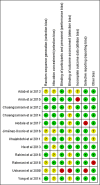Effects of curcumin on glycemic control and lipid profile in prediabetes and type 2 diabetes mellitus: A systematic review and meta-analysis
- PMID: 31013312
- PMCID: PMC6478379
- DOI: 10.1371/journal.pone.0215840
Effects of curcumin on glycemic control and lipid profile in prediabetes and type 2 diabetes mellitus: A systematic review and meta-analysis
Retraction in
-
Retraction: Effects of curcumin on glycemic control and lipid profile in prediabetes and type 2 diabetes mellitus: A systematic review and meta-analysis.PLoS One. 2020 May 22;15(5):e0233919. doi: 10.1371/journal.pone.0233919. eCollection 2020. PLoS One. 2020. PMID: 32442218 Free PMC article. No abstract available.
Abstract
Scope: Studies have demonstrated inconsistent effects of curcumin on glycemic outcomes and lipid parameters in patients with prediabetes and type 2 diabetes mellitus (T2DM). This study aimed to assess the effect of curcumin on glycemic control and lipid profile in prediabetes and T2DM.
Methods and results: A systematic search of randomized controlled trials (RCTs) was conducted from inception to June 2018 in electronic sources including AMED, ANZCTR, BioMed Central, CENTRAL, CINAHL, ClinicalTrials.gov, Expanded Academic Index, Google Scholar, ISRCTN, LILACS, MEDLINE, NCCIH, Science Direct, Scopus, Web of Science, and WHO ICTRP. Hand search was also performed. Of the total 486 records, four trials (N = 508) and eight trials (N = 646) were eligible for the meta-analysis of individuals with prediabetes and T2DM, respectively. Curcumin significantly reduced glycosylated hemoglobin (HbA1c) in prediabetics (MD: -0.9%, 95% CI: -1.7 to -0.1%, p = 0.03). Furthermore, T2DM subjects gained favorable reduction in both HbA1c (MD: -0.5%, 95% CI: -1.0 to -0.0%, p = 0.04) and fasting plasma glucose (MD: -11.7 mg/dL, 95% CI: -22.1 to -1.3 mg/dL, p = 0.03). Tendency of lipid profile improvement was also observed.
Conclusion: Our findings may encourage curcumin supplementation based on its meaningful effect on glycemic control and positive trend on lipid outcomes in prediabetes and T2DM.
Conflict of interest statement
The authors have declared that no competing interests exist.
Figures
Similar articles
-
Inulin-type fructans supplementation improves glycemic control for the prediabetes and type 2 diabetes populations: results from a GRADE-assessed systematic review and dose-response meta-analysis of 33 randomized controlled trials.J Transl Med. 2019 Dec 5;17(1):410. doi: 10.1186/s12967-019-02159-0. J Transl Med. 2019. PMID: 31805963 Free PMC article.
-
The effects of supervised aerobic training on dyslipidaemia among diabetic older patients.BMC Endocr Disord. 2024 Oct 9;24(1):212. doi: 10.1186/s12902-024-01745-8. BMC Endocr Disord. 2024. PMID: 39385223 Free PMC article.
-
Evaluation of the effect of curcumin and zinc co-supplementation on glycemic measurements, lipid profiles, and inflammatory and antioxidant biomarkers in overweight or obese prediabetic patients: a study protocol for a randomized double-blind placebo-controlled phase 2 clinical trial.Trials. 2020 Nov 30;21(1):991. doi: 10.1186/s13063-020-04923-w. Trials. 2020. PMID: 33256795 Free PMC article.
-
Effect of Curcumin on Glycemic Control in Patients with Type 2 Diabetes: A Systematic Review of Randomized Clinical Trials.Adv Exp Med Biol. 2021;1291:139-149. doi: 10.1007/978-3-030-56153-6_8. Adv Exp Med Biol. 2021. PMID: 34331688
-
Metabolic Effects of Resistant Starch Type 2: A Systematic Literature Review and Meta-Analysis of Randomized Controlled Trials.Nutrients. 2019 Aug 8;11(8):1833. doi: 10.3390/nu11081833. Nutrients. 2019. PMID: 31398841 Free PMC article.
Cited by
-
Comparative Effects of Curcumin versus Nano-Curcumin on Insulin Resistance, Serum Levels of Apelin and Lipid Profile in Type 2 Diabetic Rats.Diabetes Metab Syndr Obes. 2020 Jul 3;13:2337-2346. doi: 10.2147/DMSO.S247351. eCollection 2020. Diabetes Metab Syndr Obes. 2020. PMID: 32753918 Free PMC article.
-
Impacts of Curcumin Supplementation on Cardiometabolic Risk Factors in Patients With Polycystic Ovary Syndrome: A Systematic Review and Dose-Response Meta-Analysis.Health Sci Rep. 2025 Mar 2;8(3):e70525. doi: 10.1002/hsr2.70525. eCollection 2025 Mar. Health Sci Rep. 2025. PMID: 40041784 Free PMC article. Review.
-
Zingiberaceae in Cardiovascular Health: A review of adipokine modulation and endothelial protection via adipocyte-endothelial crosstalk mechanism.Curr Nutr Rep. 2025 May 14;14(1):66. doi: 10.1007/s13668-025-00656-x. Curr Nutr Rep. 2025. PMID: 40366476 Review.
-
Retraction: Effects of curcumin on glycemic control and lipid profile in prediabetes and type 2 diabetes mellitus: A systematic review and meta-analysis.PLoS One. 2020 May 22;15(5):e0233919. doi: 10.1371/journal.pone.0233919. eCollection 2020. PLoS One. 2020. PMID: 32442218 Free PMC article. No abstract available.
-
Comparison of the efficacy of curcumin and its nano formulation on dexamethasone-induced hepatic steatosis, dyslipidemia, and hyperglycemia in Wistar rats.Heliyon. 2024 Dec 6;10(24):e41043. doi: 10.1016/j.heliyon.2024.e41043. eCollection 2024 Dec 30. Heliyon. 2024. PMID: 39759349 Free PMC article.
References
-
- World Health Organization. Global report on diabetes. 2016 [cited 2018 Sep 30]. Available from: http://apps.who.int/iris/handle/10665/204871.
-
- International Diabetes Federation. IDF diabetes atlas. Brussels, Belgium: International Diabetes Federation; 2015.
-
- American Diabetes Association. Standards of medical care in diabetes-2017. Diabetes Care. 2017; 40(1):S1–135. - PubMed
Publication types
MeSH terms
Substances
LinkOut - more resources
Full Text Sources
Medical




